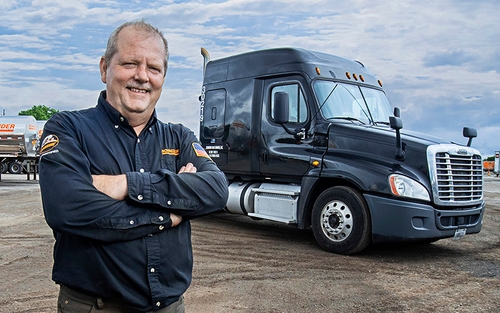How much does it cost to be an owner-operator truck driver?
October 17, 2025

Estimated reading time: 4 minutes
Knowing how to manage the costs of being an owner-operator can make or break your trucking business. Making smart decisions and staying on top of your expenses are key to being successful.
That’s why understanding what to budget for is essential. Let’s break down some of the top costs associated with being an owner-operator in the trucking industry so you can plan effectively and steer your business toward success.
8 factors that impact owner-operator expenses
1. Fuel.
Fuel is one of the largest costs that comes with owning or leasing a semi-truck. Owner-operators who average 8,000 to 10,000 miles per month typically spend $60,000-$80,000 annually on fuel.
To get an estimate of how much you will spend on fuel:
- Find the price of fuel per gallon.
- Divide that price by your truck’s average miles per gallon.
- Multiply that number by how many miles you expect to run each week.
Owner-operators who do business with Schneider can leverage a fuel discount program that allows them to take advantage of discounted fuel at nationwide truck stops.
2. Truck payments.
Buying a semi-truck
If you choose to purchase a used semi-truck from somewhere like Schneider Trucks, you can expect to pay between $20,000-$100,000, sometimes more.
If you want to buy a brand-new semi-truck for your business, anticipate spending about $150,000-$190,000.
The total price of a truck you buy, whether it’s new or used, will also depend on factors such as the:
- Make and model.
- Mileage.
- Included features and technology.
Leasing a semi-truck
Leasing a truck from a company like SFI could be a smart option if you're not ready to make a large down payment on a new truck but still want the cost-saving features and warranty protection that come with it.
If you lease a brand-new semi-truck, you could have a weekly base payment of about $1,200.
If you lease a used semi-truck, you could have a weekly base payment of $800-$1,000.
Truck lease payments vary widely between companies, so it’s important to compare your options carefully. Some key factors to consider include:
- The type, age and mileage of the trucks the company has available to lease.
- The features included with the truck.
- What’s included in the lease payment, such as maintenance costs.
- If payments are made weekly or monthly.
- The money down requirement.
3. Truck maintenance.
Generally, owner-operators can expect to spend $13,000-$25,000 on repair and maintenance expenses annually.
There are many factors that can impact the cost of truck maintenance, including:
- The age, condition and mileage of your truck.
- The cost of parts for the truck you operate.
- How often your truck’s preventative maintenance intervals are.
- Where you get maintenance done.
- The type of terrain and weather conditions you drive through.
Owner-operators who do business with Schneider can take advantage of discounts on maintenance, tires and more. They can also leverage lower-cost maintenance services offered at Schneider facilities.
4. Truck insurance.
Truck insurance can cost an owner-operator $3,000-$30,000 per year.
Insurance rates vary greatly depending on many factors, including:
- Your driving and financial records.
- The make, model and type of equipment you operate.
- The region you operate in.
- How much experience you have as an owner-operator.
- Whether you operate under your own authority or do business with a motor carrier.
Owner-operators who do business with Schneider can get great prices and coverage on insurance through the Schneider Purchase Power Program®.
5. Business documentation.
The cost of certain documentation required for owner-operators varies from state to state. For example, the cost to register your truck (intrastate business) or get apportioned plates (interstate business) differs based on where your business is located.
However, some business costs are usually consistent regardless of where you operate. Here’s an estimate of what you can expect to pay for those:
- Motor Carrier (MC)/DOT number: $300 (one-time fee).
- Heavy Vehicle Use Tax (HVUT): $550 annually.
- Unified Carrier Registration (UCR) fees: $46 annually.
- International Fuel Tax Agreement (IFTA) decal: $10 annually.
6. Freight.
Some of the ways to get loads as an owner-operator have fees associated with them, while others do not.
For example, using a dispatching service or hiring a freight broker typically come with added expenses. On the other hand, relying on free load boards or doing business with a carrier, like Schneider, doesn’t cost anything.
7. Taxes.
Owner-operators are required to pay taxes on a quarterly basis. To prepare, American Truck Business Services (ATBS) recommends setting aside 25% to 30% of your weekly income for quarterly taxes.
Fortunately, there are certain tax deductions you can take advantage of as an owner-operator, including expenses for:
- Hotels.
- Meals.
- Truck payments.
- Truck maintenance.
- Insurance.
- Business fees.
- Truck supplies.
- Safety gear.
8. Food and drinks.
It’s easy to forget to include the cost of food and drinks in your monthly budget.
To save on food costs, owner-operators can invest in a refrigerator and microwave (some trucks include these features with the lease or purchase of the truck) to put in their truck. That way, you can purchase food from grocery stores versus spending more on more costly meals at restaurants.



